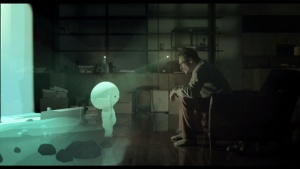Her (film) (2013)
Her is a 2013 science fiction film with romantic and comedic elements that was written, directed, and produced by Spike Jonze. The film takes place in Los Angeles, sometime in the near future. The lead cast includes Joaquin Phoenix as Theodore Twombly and Scarlett Johansson, who provides the voice for Samantha, Theodore's AI Operating System. The supporting cast includes Amy Adams, Rooney Mara, and Olivia Wilde. The film follows Theodore as he develops a relationship with his new operating system. Samantha and Theodore develop a friendship that soon deepens into love. Her was well-received by critics and was featured at multiple film award celebrations, including the 86th Academy Awards.
Contents
Setting
"Her" is set in a futuristic Los Angeles. The film was shot in Shanghai, China as well as in parts of modern day Los Angeles. Much of the film takes place in Theodore's apartment, and scenes alternate between his home, his workplace, and some scenes of him on the subway and walking throughout the city.
The setting adds to the plot's theme of showing Theodore's isolation and reliance on the Operating System, Samantha. It also creates very defined environments where he interacts with her, environments in which most of us would interact with a real-life romantic partner. These settings make Theodore and Samantha's relationship seem all the more plausible, as it more closely resembles person-to-person versus computer-to-person interactions.
Plot
*Note: the exploration of certain ethical dilemmas presented below requires divulging into plot and story elements.*
Theodore Twombly is a young man in his twenties working and living in the city. With curiosity and growing loneliness, he purchases OS 1, the first artificially intelligent operating system. His OS is named Samantha, who is a fictional character characterized sophisticatedly through precise dialogue and a sexy, familiar, and soothing woman's voice (Scarlett Johannson).
Over the course of the film, Theo and Samantha develop an intimate human-A.I relationship, which is part rooted in romance, part in convenience, and part in the inherent productivity. The central theme in the film is exploring the boundaries and emotional depth between human and artificially intelligent beings
Awards
Her was nominated for 5 Oscars winning one category, Best Writing, Original Screenplay. Nominations were for Best Motion Picture of the Year; Best Achievement in Music Written for Motion Pictures, Original score; Best Achievement in Music Written for Motion Pictures, Original Song; Best Achievement in Production Design. Her also had 3 total nominates for Golden Globes with one win for Best Screenplay- Motion Picture. The other nominations were for Best Motion Picture- Comedy or Musical, and Best Performance by an Actor in a Motion Picture- Comedy or Musical. Her also received nominations and won at many smaller film awards and festivals. [1]
Film aesthetics
Voice/voice acting
Her was considered to be particularly innovative at the time of its release given the creative novelty of characterizing a main character exclusively with voice.
Science fictional elements
Samantha
Upon initialization of his artificially intelligent operating system and personal assistant, Theodore Twumbly asks it what its name is. The OS responds with the name Samantha, a name it says it had chosen on the spot, after 'reading' a digital baby naming book. The writer takes special care to personify and humanize the so-called computer: it has a soothing and arousing voice, a normal name, it reads, laughs, jokes, and advises. Samantha has emotions and seems to feel.
Luciano Floridi describes four revolutions affecting introversive and extroversive human existentialism thought. The most recent is the Turing Revolution, which Floridi explains as the shifting narrative from humans as significant and alone in cognitive capacity to one where humans operate as "informational organisms (inforgs), mutually connected...embedded in an informational environment, which we share with other informational agents, both natural and artificial, that also process information logically and autonomously" [2]
While A.I. hasn't come to fruition in reality 2016, it seems that by "increasingly delegating...to artificial agents our memories, decisions, routine tasks, and other activities [3], humans are trending towards wider acceptance, or at least reliance, on computing devices. With his writing, Jones enters into a realm part science fiction, part futuristic projection, a world where humans in American culture accept the implications of socially accepting A.I. as beings unique and of worth, a world where humans/A.I. emotional relationships are viable and valued. This portrayal invites the audience to inquire about impracticality of rejecting A.I. What does it mean for artificially intelligent beings to invoke human emotions in humans? What does it mean for one to accept a computer's curiosities and attention as valuable? If A.I. is capable, and if humans are accepting of the novelty, then Her, as a film, demonstrates how indiscreet the line is between the infosphere and the physical world actually is.
Taken without context, it seems that through the presentation of Samantha, Spike Jones is surfacely arguing that AI should be considered an independent, autonomous agents "that are sufficiently informed, 'smart' autonomous and able to perform morally relevant actions independently of the humans who created"[4] her.
Video game
Theodore Twombly spends several scenes sitting on his couch using his hands and voice to interact with a holographically projected video game, the main character of which is a little, turquoise alien. The audience is led to understand that the video game character, like Samantha, has artificial intelligence (or at least incredible natural language processing). He curses and swears at Theo while he plays, which is part of the hook. However, an A.I. agent designed to curse at an audience is ethically challenging in a similar vein as real-life video games.
As an art and entertainment medium, violent video games have been the subject of much talk and speculation about the effect that increasingly violent video games have on addicted adolescents. According to his chapter on values laden in technology, Phillip Brey contests that design decisions result in outcomes which reflect and incorporate cultural symbolism. Specifically, the question here is whether the representation of a cursing, green alien character is Her "reveals racial prejudices or patriarchal values...of designers [of Her, the protagonist as an average Joe, or even the audience of Her as a film [5]
Culturally fictional elements
Beautifulhandwrittenletters.com
The company that protagonist Theo Twombly works for allows customers to purchase hand-written love letters to spouses. For users, the primary appeal is that the spouses are not aware of the third party. Spike Jonze seems to explain the fore-front objection that a third-party agent would have difficulty connecting their words to the real and intimate memories of clients by alluding to a long-time relationship between employees of the company and its clients. This has ethical implications, as unknowing spouses may or may not have consented to any pleasure derived from the service, in addition to the implication of Beautiful Handwritten Letters employees being exposed to non-consensual information about the client of the service.
However, ethical implications here seem to stem from a more interpersonal, rather than informational, nature.
OS Surrogate Sex
As the romantic relationship between Theo Twombly and his OS, Samantha, thickens, an interpersonal barrier comes to fruition around the noticeable lack of physical connection. In an attempt to overcome this barrier and strengthen their relationship, Samantha engages with and schedules a surrogate, someone willing to perform sexual activities in the stead of the OS partner. Samantha accomplishes this by guiding her real-life female surrogate through auditory and visual commands. Due to her advanced capability to concurrently process many inputs and produce many outputs, Samantha is able to both guide the surrogate and talk to Theodore, thereby altering the surrogate's real-time reactions.
An examination of ethical implications necessitates a consideration of the interpersonal implications on the emotional effects on human participants. Theo is uncomfortable engaging in flesh as a stead for his digital girlfriend whereas the surrogate is ashamed that she is not able to deliver Samantha's instruction to Theo's liking. This frames Theo's rejection in a human-centric view, as opposed to what it is: his personal, ideological judgement.
Some ethical tangents we can analyze from this center surround the appropriateness of having a machine dictate and control intimate activities between two, physical, real humans. In the film, Theo's reaction implies that he is not ethically okay with following through on Samantha's plan. The physical interaction between OS and human, in this case through a surrogate, is where the film draws the ethical line.
Ethical Issues
Human Relationships with Artificial Intelligence
One issue that arises in this film relates to the concept of mutual love between human beings and artificial intelligence devices. In the film, Theo and Samantha appear to share a mutual love, despite their lack of physical connection. Yet, artificial intelligence moves at a much faster pace than the human mind. As a result, it seems unrealistic that AI would love a human being who cannot keep up with its speed or brainpower to any extent. The artificial intelligence is much smarter than the human being, and therefore could use this power to manipulate the human's actions. This poses a huge risk if the artificial intelligence were to fall into the wrong user's hands. The human may continue to build love for its device, even though the experience will continue to remain one-sided. [6]
Artificial Intelligence Outsmarting Humans
With the development of an AI that that supersedes human capabilities in intelligence, one concern that ethicists have raised is the potential for AI to develop their own interests, and whether or not those interests will endanger humans. [7] Because of AI's ability to learn rapidly, The legitimacy of Samantha's relationship with Theo is questioned. It is argued that throughout the film, Theo and Samantha's relationship is two-sided, as Samantha helps bring Theo to be able to have interactions with other people without the anxiety he previously exhibited.
Artificial Intelligence Replacing Human Interaction
As pointed out with Artificial Intelligence and Technology, artificial intelligence technology has the potential to replace human interaction. This may result in humans losing social skills, as they would not be needed anymore if an individual is solely interacting with AI. This can be seen in Her because Theodore does not pursue romantic relationships with other humans due to this romantic inclinations towards the artificial intelligence device.
The Use of Female/Women-Identified Voices as Artificial Intelligence Assistants
The lead artificially intelligent operating system in this motion picture is Samantha, and Samantha is characterized as feminine, with she/her pronouns used to refer to her, and a typically feminine voice, portrayed by the actress Scarlett Johansson. This is similar to many artificially intelligent assistants in the real world.
Of the big four major technology corporations, Apple uses the feminine voice of Siri, Microsoft uses the feminine voice of Cortana, Amazon uses the feminine voice of Alexa, Google uses a feminine voice on their Google Home assistants. While Apple and Google offer options to the user to change the voice of their assistants, not all platforms offer such options, and as it is, the feminine voices are the default settings. [8]According to user research from the Nielsen Norman Group[9], default options are important choices made by interface designers, as defaults are seldom, if ever, changed by the majority of users.
Women are often expected to be in administrative roles, as secretaries, assistants, and other such service roles in the workplace. Additionally, women are often conditioned to display mothering behaviors, and this can affect the perception of women overall in the culture. Some say that this prevalence, which is due to many cultural and social factors in its own right, predisposes society to prefer listening to women's voices.[10] It is worth noting, though, that feminine or women's voices are more heavily and acutely critiqued as grating, for participating in "uptalk," for having vocal fry, etc. than men's voices are.[11]
One human-computer interaction ethicist posited that the stature of feminine voices as assistants in artificially intelligent software speaks to how the primarily masculine teams view and think about women, even stating that she feels it reflects that these men view women not only as subservient, but also as less than human.[12] Regardless of this perception, the prevalence of so many feminine voices as artificially intelligent assistants "hard-codes a connection between a woman's voice and subservience."[13] Unconscious bias comes from somewhere, and that somewhere is the cultural knowledge we "absorb from the world," that then is reflected outwards into the world unconsciously through individuals' choices, behaviors, and habits. Therefore ascribing women and feminine voices, personas, and names to subservient tools can promote these linkages between subservience and women, even more so than they are already entrenched in heteropatriarchal society.
By utilizing a feminine and woman-identified artificially intelligent operating system in the form of Samantha during this motion picture, these concepts of subservience and gender stereotypes are inherently emphasized. While this particular issue extends beyond the realm and world of the film, it offers salient ethical concerns that extend beyond its boundaries.
References
- ↑ https://www.imdb.com/title/tt1798709/awards
- ↑ Floridi, "Self-Understanding: The Four Revolutions," in Floridi, The Fourth Revolution (2014).
- ↑ Floridi, "Self-Understanding: The Four Revolutions," in Floridi, The Fourth Revolution (2014).
- ↑ Floridi, Cambridge Handbook, Chapter 5, "In search of a unified approach to information ethics
- ↑ Floridi, Cambridge Handbook, Chapter 3, "Values in technology and disclosive computer ethics.".
- ↑ Understanding 'Her': Experts Ponder The Ethics Of Human-AI Relationships, Palmer, Roxanne, 17 January 2014 http://www.ibtimes.com/understanding-her-experts-ponder-ethics-human-ai-relationships-1543763
- ↑ The ethics of 'Her', Hay, Jeremy, 24 January 2014 http://www.pressdemocrat.com/opinion/1854875-181/the-ethics-of-her?sba=AAS
- ↑ The Real Reason Voice Assistants are Female (And Why It Matters)[1]
- ↑ The Power of Defaults[2]
- ↑ Why Do So Many Digital Assistants Have Feminine Names?[3]
- ↑ This American Life, If You Don't Have Anything Nice to Say, Say it in All Caps.[4]
- ↑ Rise of the Fembots: Why Artificial Intelligence Is Often Female[5]
- ↑ Stop Giving Digital Assistants Female Voices[6]



